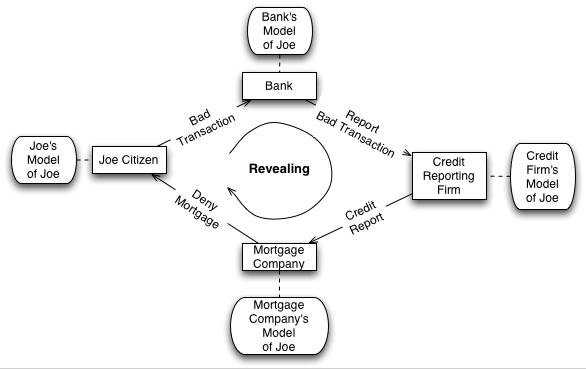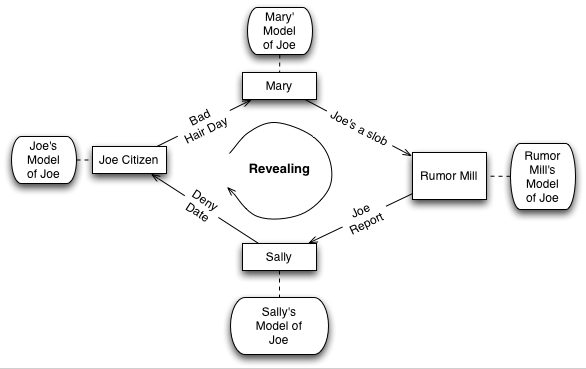I’ve spent much of the week playing with different model of the identity problem than I usually use. This model arose because I wanted to draw some pictures to help people visualize how an Joe’s internet identity is the union of models held by the firms: your bank has one, DoubleClick has another, etc.
I spun this story: Joe couldn’t get a mortgage from Mort, his mortgage company. Mort found something that in his his credit report. Mort bought that report from Cret, a credit reporting firm. Cret got the troubling information about Joe from his a bank. Seems Joe opened an account at the Bank and then immediately had a NSF (no sufficient funds) event. I happen to know that this happened because the bank charged Joe for his new checks before this very same bank had cleared the funds for his initial deposit; but yeah Mort and Cret don’t know that.
Now initially my plan was just to use that story to point out how there were four models of joe in the story. Joe’s, the bank, Cret, and Mort’s. But, my attention wandered. I drew the picture below of the relationships. At that point I got interested in the relationships, the transactions flows, and the governance rules around them. Notice how Cret has no relationship with Joe.

This helps you to think clearly about the rules the privacy puzzles in this story. For example Joe, probably unknowingly, licensed the bank to reveal information when he signed up for his account. In addition to the contracts that govern the relationships between pairs in that drawing there are the laws and regulations of various governments and industry consortium in play; for example my state has laws on the books to give Joe at least a chance to deal with Cret. Of course there are also ethical and cultural norms.
We can also add in the various models and the cycle of revealing that got Joe’s mortgage request declined.

When thinking about problems like this I try to sympathize with each of the roles. The mortgage company, for example, is seeking to do due diligence, or a background check, on Joe. They are looking for a trusted third party or at least a disinterested third party. Notice how Cret’s lack of a direct relationship with Joe adds to their claim of being a disinterested 3rd party.
I also like to engage in various exaggerations of the model. See what turns up when you look at edge cases. So here’s another story. Later that day Joe got turned down for a date with Sally. Sally asked her friends about Joe. The rumor mill reported back that Joe was a slob. Since this is my story I happen to know that the rumor mill came to know this because fastidious Mary once saw Joe when Joe was having a particularly bad hair day. This story has the same four players and the same schematic as Joe’s tough time with the mortgage company.

Joe’s desired to fix the model of the credit reporting firm. Now he want’s to fix the model the rumor mill has of him. Joe’s got some real challenges ahead! My state has rules and regulations to help him with the first. My culture, the American one, has rules too – we love to hand out second chances.
In the dating story the rumor mill fills the role of disinterested third party when Sally goes off to get a background check on Joe. Joe’s model of that is that they are talking behind his back. Which they are.
As a break from the fun of playing with the stories these are possible names for the four roles shown in these examples.
- Model Revealer – aka Joe’s Bank, or Fastidious Mary.
- Model Aggregator – aka the credit reporting firm, or the rumor mill.
- Model Builder – aka the mortgage company, or Sally.
Then I read this article about alibi clubs (see also). Average Joe’s solving these problems for them selves!
So a third story, this time with an alibi club. Joe turns out to be a jerk. In fact he’s married! His wife suspects he’s running around. She accuses him of trying to get a date with Sally. But wait! Joe is a member of an alibi club. He sends a text message to the club. “Quick need alibi!” and one of the members volunteers and gives him a call. They work out an alibi and later as the argument with his wife proceeds he says. “Look you don’t trust me? Call the garage! They’ll back me up. Here I’ll, damn it, I’ll even get you the damn number.” Wife calls ‘garage’ and alibi is delivered.
In this story the alibi club has captured the role of trusted disinterested third party. Joe and his friends in the alibi club have cut out the middleman and fraudulently simulated the top part of the revealing cycle. Oh my God! It’s another example of the Internet disintermediating!
As one of my friends pointed out at about this point; this model is an excellent generator of stories and crimes.
Very nice variation on the dating story from real life: http://accordionguy.blogware.com/blog/_archives/2003/4/7/70214.html
Pingback: Ascription is an Anathema to any Enthusiasm » Blog Archive » Rich Relationship